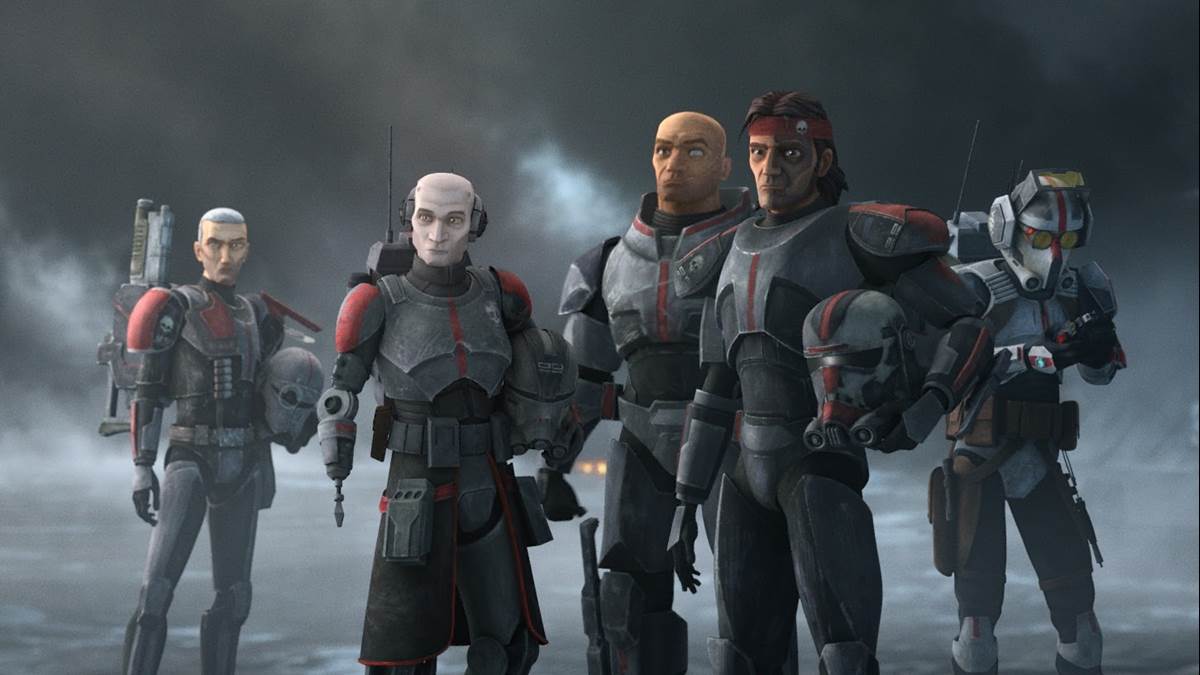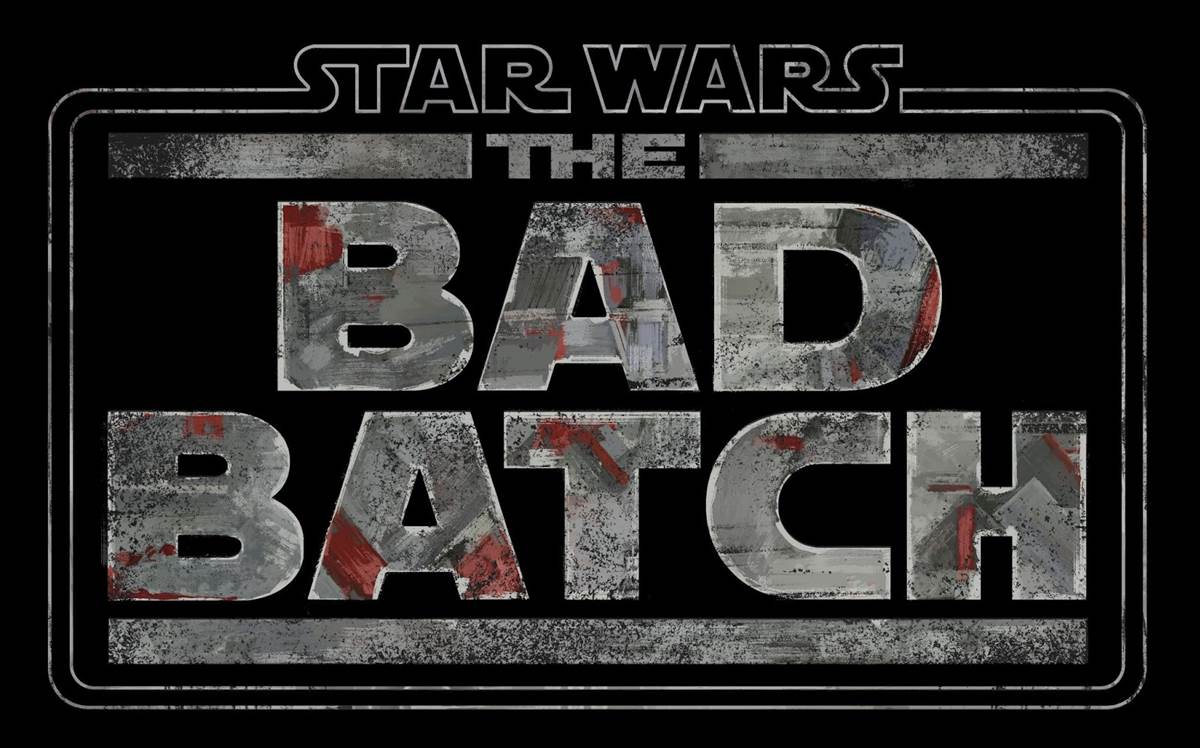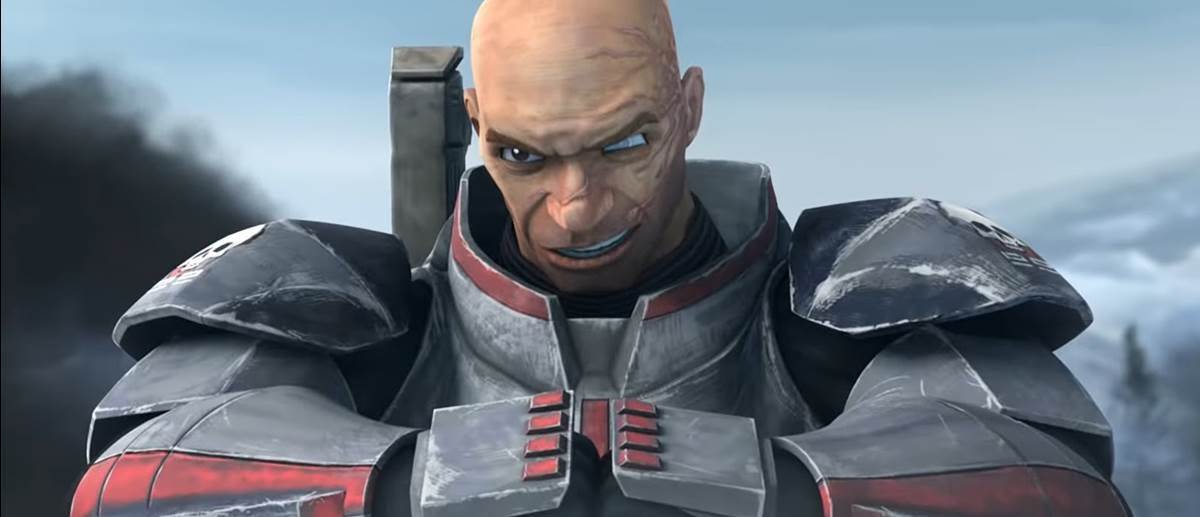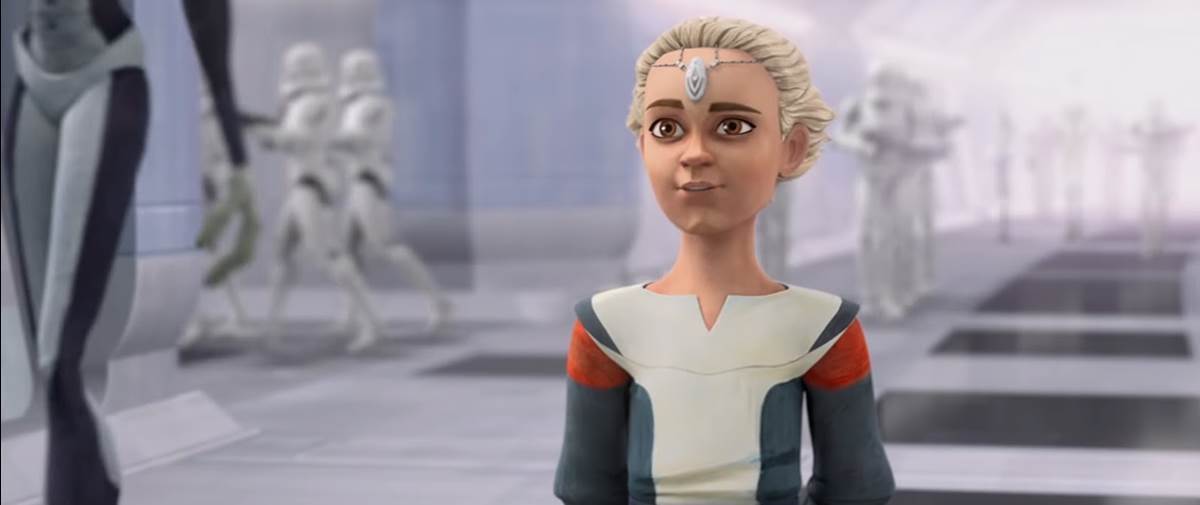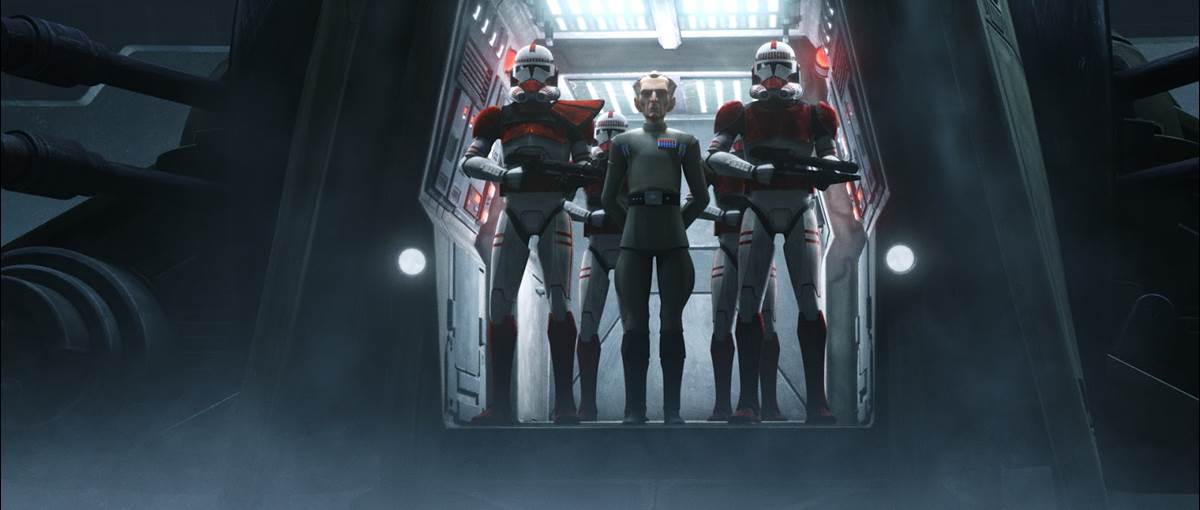Tomorrow, as a special treat for Star Wars Day (May the 4th– as in “May the Fourth Be with You”), fans will get to see the first full episode of the highly anticipated new Disney+ Animated series Star Wars: The Bad Batch from Lucasfilm Animation. And recently I had the pleasure of participating in a press conference-style discussion of the series with the show’s head writer Jennifer Corbett (NCIS), supervising director Brad Rau (Star Wars Resistance), and prolific voice actor Dee Bradley Baker (Star Wars: The Clone Wars).
Together Corbett and Rau (who also serve as executive producers for Star Wars: The Bad Batch) talked about the behind-the-scenes process of bringing the series to life for Disney+, while praising Baker’s versatility as a performer. And Baker opened up the conversation by breaking down the members of the titular Bad Batch.
“Well, of the team, you've got Hunter, who's kind of the leader of the pack,” says Dee Bradley Baker, who voices all the clone members of the group. “He's got tracking skills and smell and this heightened sense that helps him gauge the terrain. And then you've got Tech, who is very technically oriented, always has a handheld device that he's working on, and is super cool, super calm, and competent with all things technical. Then you got Wrecker, who, to no surprise, is the muscles of the group who's got incredible strength. And then you've got Crosshair. Crosshair is the sharpshooter of the group who is kind of a contrary character and quite interesting in the dynamic. And then you've also got Echo, who is a modified android clone from the Clone Wars episodes, who was brought on board with the Batch. That's the gang, and together they are a force to be reckoned with.”
But does Baker have a favorite member of the Bad Batch to voice? “It's fun to be Wrecker, because he's so honest and so clear and funny. But I have great affection for all of them. They're all very interesting fellows, but Wrecker– he's probably the furthest away from me of all of them. And he's great fun. Clone Force 99 is another step beyond what I've been asked to do in The Clone Wars series. The tricky part for the clones is that the differentiation is much tighter between characters. It has to be decisive; it has to be clear. The Bad Batch are actually much further apart from each other, which oddly makes it a little bit easier to jump from character to character to character. For me it feels like I'm jumping from rock to rock on a stream. I can see the rock– the writing is clear. And that's what I jump to, that character.”
“I can see them. I feel like I know them, and it actually helps that they're further differentiated vocally, and also in terms of their personality and their mood, shall we say? So it comes off looking more as a magic trick than it does maybe with the clones, but it's still a really fascinating process as a voice actor to have these scenes where I'm just talking to myself. Just switching from character to character to character as we go through the script, which is typically how we do it. We just go straight through it. It's fantastic fun. It's really an interesting project.” “It's impressive to watch him do it in the room, because when we first started I thought he was gonna go a character at a time,” says Jennifer Corbett. “Just watching him act out a scene with himself, with all of these clones– there's no pause. He just goes right into it, and I was blown away. Each time we do one of these record sessions, I'm just amazed at Dee's talent.”
With the series being set after Order 66 and the rise of the Empire, Jennifer Corbett commented on exploring this exciting era in the Star Wars timeline. “This time period is one of the reasons I got so excited about this show, other than this oddball group of characters. I just found it intriguing and engaging to watch a series where we've seen the Clone Wars where it's the height of the clone troopers doing what they're meant to do and what they were created for. And the question became, ‘What happens after the war is over? What happens to clones who all they know is being soldiers… especially for the Bad Batch who do things differently as it is with the Republic, and how they fit in once it becomes the Empire?”
“Because obviously, [these are] two very different regimes, and [we see] how they react to this new environment and the new way of doing things and new way of following rules. Which, again, isn't their favorite thing to do. But it was interesting to talk about the transition from the Republic to the Empire and what that looks like, because it's not what we saw in the original trilogy, where it's the dominance of the Empire. It's kind of like the early stages, and I found it interesting to show planets and places that were happy that the war is over, and they don't really understand the implications of what an Empire actually means. It's kind of laying the groundwork for what everyone knows the Empire to be later on.” Dee Bradley Baker concurs about the transition to Imperial rule and the Bad Batch’s role in that transition: “In the sudden, shocking transition from Republic to Empire, it becomes a much more rule-based power structure [in] the galaxy. And the Bad Batch are not so much a rule-based unit. They're very much a team, but they're not like the clones are, where it’s more of a top-down command structure. And it's very interesting to place them in the middle of this transformational moment and to see how that plays out.”
In a recent trailer for The Bad Batch, we were also introduced to a mysterious new character named Omega that already has fans theorizing about her possible function in the series and the larger Star Wars mythology. “It's a fascinating relationship that unfolds,” says Dee Bradley Baker about Omega’s interactions with the Bad Batch. “Because at first, of course, the team is kind of their own sealed unit, and they're certainly not used to having anybody else along or working with anybody else, although they did bring along Echo after he proved himself to them. They came together on that, but it's interesting in terms of the story and the writing to have this personal relationship with the younger character, and to see how that changes and how they accommodate that. Because it's more an uncle/niece or a father/child dynamic, but not entirely. It's not just an action story, as Star Wars never is. There's a personal story that's also playing out as well, that connects you to the entire [overarching] story.”
Brad Rau continued with the discussion of Omega: “She's so great, because we have this awesome team of elite clones, and everything we've been talking about in this changing galaxy. And this time period that, as a fan, I'm just so excited to see, because we haven't seen that much about the rise of the Empire. So, to have these clinical, best-of-the-best soldiers as suddenly fish out of water in this changing galaxy, and to have this kid to help raise in a very parental way– it's a two way street, honestly, the way that works. None of them are really equipped to go out into the world. You know, how do they eat? They don't have a mess hall to go to. How do they get their gear fixed? How do they get fuel for their ship? These are all things that we get into. It is really interesting to deal with this family dynamic. To have the stories be emotionally charged, and emotionally based gives the action a lot more texture, honestly. Because, let's face it, we're blowing stuff up and we're having fun doing that, but to have the emotional context of that is the challenge, I think, in any of these stories. And for us, it helps that we are coming into [this with] characters that are familiar and yet we don’t know that much about. It gives us room to play around with how those characters develop.”
I asked Rau about the visual style of The Bad Batch, which is very similar to its predecessor The Clone Wars, as opposed to other Star Wars animated series like Rebels or Resistance that went out of their way to establish their own unique looks. “That's very intentional. As you know, The Bad Batch is a spiritual successor to Clone Wars, so we wanted to honor the style and the legacy of that. That being said, the whole team at Lucasfilm and our partners at [CGI production service] CGCG, we've just tightened everything up. So the fidelity is tighter; the style is tighter; the rigs are tighter. The way that it's designed is still the legacy of The Clone Wars, but a little more detailed… [a] little bit more focused. And the work we're doing, for me, having worked on a lot of these shows with a lot of the same people internally, it's just the best team and I think we're doing our best work ever right now. It’s really fun.”
Jennifer Corbett discussed how her experience serving in the United States Navy helped her prepare for writing the series. “When I first saw the original story arc for The Bad Batch that was meant for The Clone Wars’ final season, I immediately responded to it because I got the dynamic between this squad. I understand how people in the military become brothers and sisters very closely when you're sent on missions together, when you're in close quarters– the camaraderie and also the banter that comes with living with people so closely in high stress situations. So I think that's what I try to bring to it: how this squad, even though they are these elite soldiers, they are this family. But they don't have to agree all the time [about] all the things. [I like] all the different perspectives that each of them brings, because they're all so very different. I think that speaks to the military. No one comes from the same background, everybody has their different reasons for doing what they're doing. It is a family dynamic in real life.”
Corbett also talked about her experience working alongside Star Wars animation mastermind Dave Filoni, who is overseeing The Bad Batch. “I got to work with Dave on Star Wars Resistance, which was such a great experience. And getting the chance to develop this series with him, it's kind of like a master class in writing Star Wars. With this being a sequel series of sorts to The Clone Wars, it was crucial that he be involved in this process very much, because these are characters that he's created and it’s the world that he knows. But every day is a learning experience, and it's so exciting to see this show grow and develop with this team. He's been fantastic to learn from.” “Yeah, absolutely. Dave, he's awesome,” agreed Brad Rau. “I've known Dave for a long time. When he was starting Clone Wars, I first met him up at the Skywalker Ranch. I happened to just be starting my own animation studio at that time, so I was unable to join the force of The Clone Wars. It was one of my regrets that I rectified later on in Rebels, to join as an episodic director, and then on Resistance. He’s an awesome guy, a really good friend. I couldn't think of a better mentor, especially for Star Wars. The stuff he tells us every day is fantastic and amazing. Collaborating with him and being able to work with Jen so closely on this show's been awesome. It's been a dream come true.”
Star Wars: The Bad Batch premieres tomorrow, May the 4th, exclusively on Disney+.

